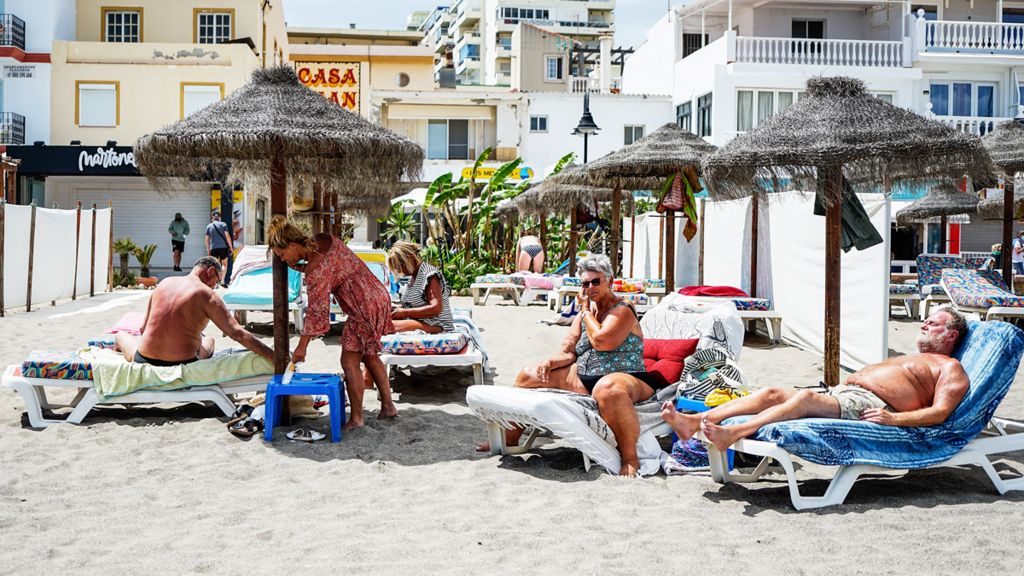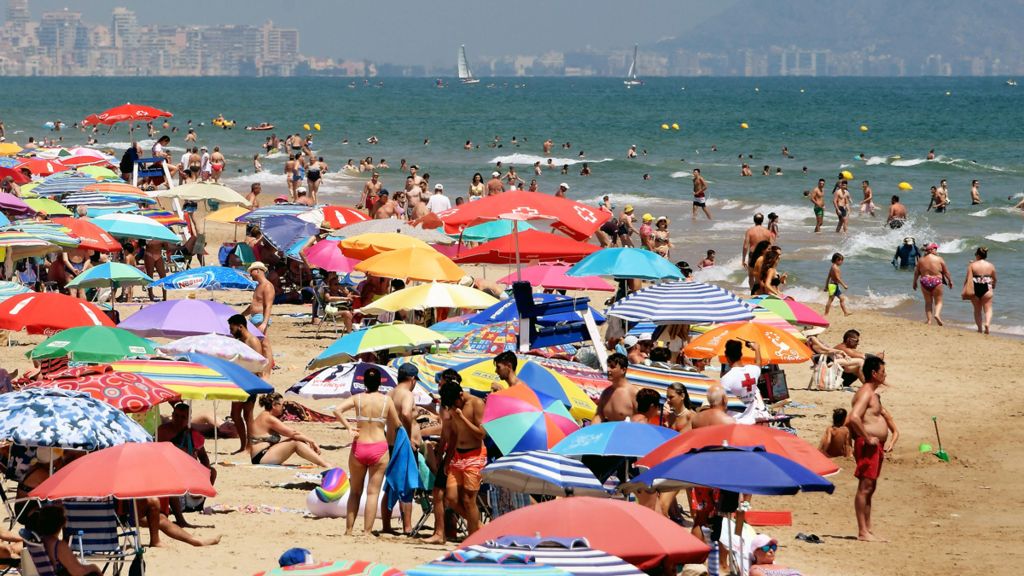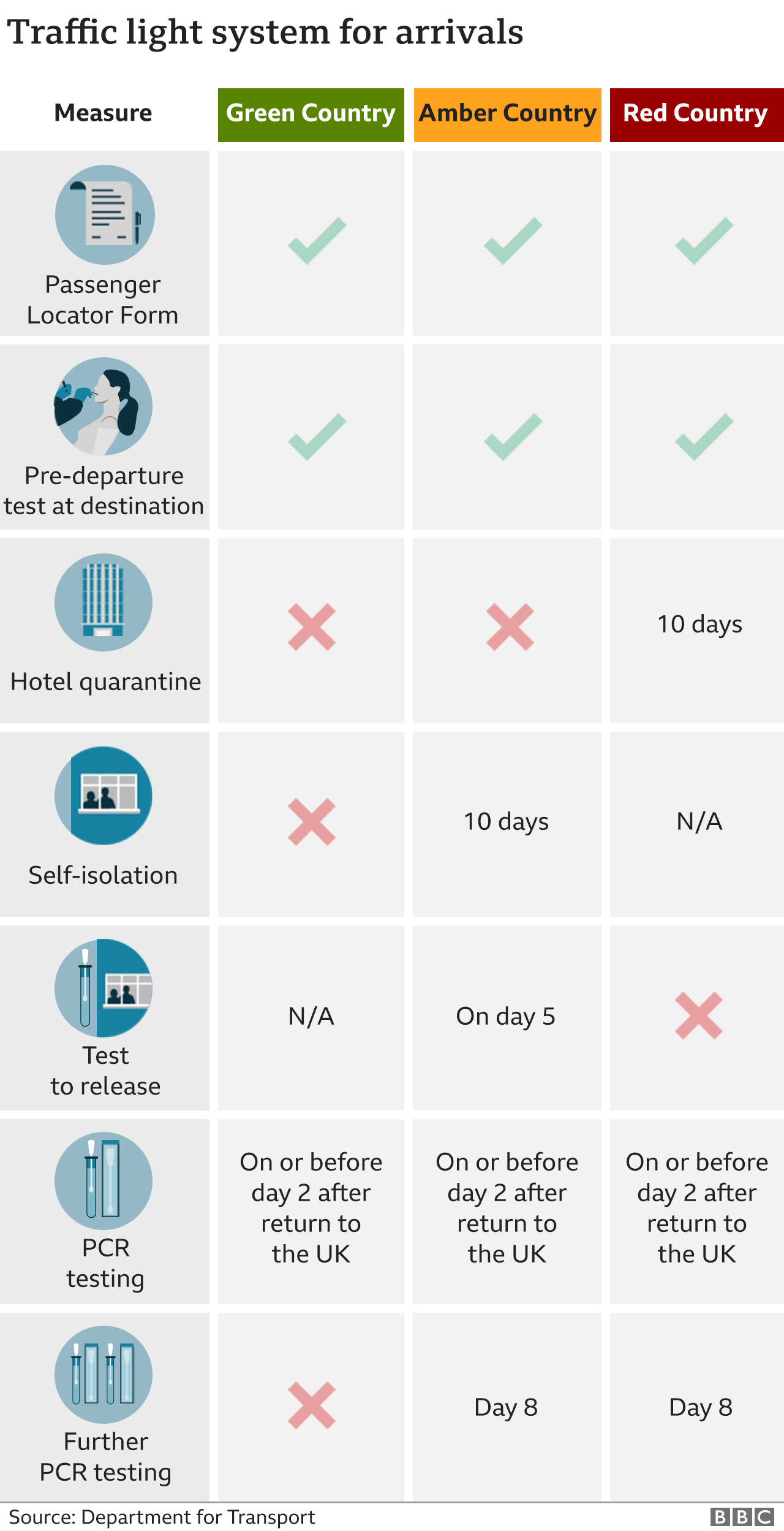What are the rules for travelling to green, amber and red list countries?
Foreign holidays are now possible, but travellers must follow strict rules on their return.

image copyrightGetty Images
British tourists can now go to Spain without taking a Covid test on arrival, but from 31 May must quarantine for seven days if they go to France.
The UK government says you should not visit most countries unless there are “exceptional circumstances”.
It is legal for people across the UK to take foreign holidays – although Welsh residents have been asked not to travel abroad.
On England’s traffic light list, foreign countries are classed as green, amber or red – with different rules for quarantine and Covid tests in place.
Government guidance is that you should not holiday in red or amber countries – including Spain and most other countries.
Holidays to countries on the green list – including Portugal – can go ahead without a need to quarantine when you return.
The list is reviewed every three weeks and countries can be moved at short notice. There are similar rules for Scotland, Wales and Northern Ireland.

image copyrightGetty Images
Holidaymakers need to check whether their destination is admitting tourists. The government says this is the responsibility of travellers.
- Spain (amber list) has lifted restrictions for UK travellers, who no longer have to take a PCR Covid test when they arrive
- Portugal (green list) requires a passenger locator card and a PCR test proving you are fit to fly
- Germany (amber) says anyone arriving from the UK must quarantine for two weeks – because of concerns about the India variant
- France (amber) requires proof of a negative PCR test taken less than 72 hours before departure and a “sworn statement” to say you are not suffering from Covid symptoms. From 31 May, you must have a “pressing reason for travel”, a negative PCR test result taken less than 48 hours before departure and self-isolate for seven days upon arrival
- Italy (amber) does not require self-isolation on arrival if you have proof of a negative test, taken no more than 48 hours before departure
- Most travellers from the UK to the US (amber) have been unable to enter since March 2020
The European Union is working on a “white list” of countries whose citizens can visit freely.

Holidaymakers can visit green list countries and territories without having to quarantine on their return.
The list currently contains only a small number of destinations – Portugal, Iceland, Israel, Brunei, Singapore, Australia, New Zealand, Gibraltar, the Falkland Islands, the Faroe Islands, South Georgia and the Sandwich Islands, St Helena, Tristan de Cunha and Ascension Island.
Transport Secretary Grant Shapps said islands such as the Canaries and Majorca could be added to the green list from 7 June.
If you’re returning from a green list country, you must:
- take a Covid-19 test before departure and have proof of a negative result
- book and pay for a test for day two after your return
- complete a passenger locator form
You do not need to quarantine on arrival unless your day two test is positive, or NHS Test & Trace informs you that you have travelled with someone who has tested positive.

Most countries in the world are on the amber list, including popular holidays destinations like Spain, Greece, Italy, Canada and the US.
Travel to amber list countries is legal, but the government says you should not do so for leisure.
Asked whether it was responsible to go on holiday to an amber country, Transport Secretary Grant Shapps said: “The guidance is not to. We’ve said you should only go to amber countries in exceptional circumstances.”
Many companies are offering holidays to these countries and the BBC has spoken to people who say holiday companies are refusing to refund or exchange bookings.
If you’re returning from an amber list country, you must:
- take a Covid-19 test before departure and have proof of a negative result
- book and pay for a Covid-19 test on days two and eight after your return
- complete a passenger locator form
- quarantine for 10 days at home or the place where you are staying
It may be possible to end quarantine early if you pay for a further private Covid test through the test-to-release scheme.

Red list countries are those the UK government says are at the highest risk from Covid, and should not be visited “except in the most extreme of circumstances”.
Dozens of countries are on the red list, including India, Pakistan, Turkey, Brazil and South Africa.
If you have been in one in the last 10 days, you can only enter the UK if you are a UK or Irish national, or UK resident.
If you’re returning from a red list country, you must:
- take a Covid-19 test before departure and have proof of a negative result
- complete a passenger locator form
- self-isolate for 10 full days in a government-approved quarantine hotel, which you must book and pay for in advance
Rates for these hotels are:
- 10 days (11-nights) for one adult in one room – £1,750
- Additional rate per adult (or child over 11) – £650
- Children aged five to 11 – £325
You can be fined £10,000 or jailed for providing inaccurate details.

Anyone planning to travel to an amber or red list country should check their proposed destination on the FCO country advice pages.
If the FCO advises against travel, then travel insurance would almost certainly be invalid.
If not, then the cost of medical treatment abroad would be covered. In most cases that would include Covid.
People travelling to green list countries should also be aware that few policies will cover their costs if they contract Covid while away and can’t fly home.
People travelling from England who have had both Covid jabs can demonstrate their vaccination status via the NHS app or a letter.
People in Scotland can also now request a vaccine certificate from the NHS inform website or by calling 0808 196 8565, if they are due to travel in the next 21 days.
The BBC is not responsible for the content of external sites.

